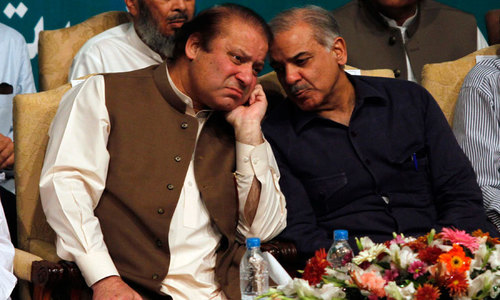Amidst the leadership vacuum left by Nawaz Sharif's disqualification by the Supreme Court on grounds he had been dishonest and therefore unfit for office, PML-N leaders on Saturday decided to rally behind Nawaz's younger brother, Shahbaz Sharif, as his eventual successor.
Shahbaz's ascension, however, cannot be immediate as he is currently does not hold a seat in the National Assembly. In the time it takes for him to leave his post as chief minister Punjab, be elected to parliament, and then secure enough lawmakers' votes to move into Prime Minister House, an interim prime minister will oversee the affairs of the country.
Shahid Khaqan Abbasi, who was till Friday the petroleum minister, has been tapped to take over this role till the time Shahbaz is ready to take over.
The following are brief profiles of the two.
Shahbaz Sharif
Born in Lahore in 1950, Mian Mohammad Shahbaz Sharif is the younger brother of Pakistan Muslim League-Nawaz (PML-N) chief and thrice-elected prime minister Nawaz Sharif.
He is currently serving his third term as Punjab’s chief minister. Shahbaz previously held the post from 1997-1999, before former military ruler Pervez Musharraf exiled the Sharif brothers to Saudi Arabia, and then again from 2008-2013.
Considered a workaholic, Shahbaz likes to call himself Khadim-i-Aala (chief servant) rather than chief minister.
Shahbaz is the second son of Mian Mohammad Sharif. He is an influential businessman and jointly owns Ittefaq Group of Companies. He was also elected president of Lahore Chamber of Commerce and Industries in 1985.
Shahbaz was first elected MPA to the Punjab Assembly in 1988. In 1990, he chose to run for a National Assembly seat, returning as an MNA. However, in 1993, he again stood for a provincial assembly seat and became leader of the opposition in the Punjab Assembly. His term ended in 1996 when the assemblies were dissolved.
After his win in the 1997 election, Shahbaz earned the opportunity to serve the largest province of the country for the first time and remained its chief minister until Musharraf’s military coup in 1999.
Following his return from nearly a decade-long exile, Shahbaz became chief minister of Punjab for the second time after PML-N won the majority number of seats in the province in the 2008 election.
Shahbaz won three Punjab Assembly seats (PP-159, PP-161 and PP-247) and one National Assembly seat (NA-129), however, he opted to retain PP-159.
The Metro Bus projects in Punjab are frequently touted as his biggest achievements.
His son, Hamza Shahbaz Sharif, serves as an MNA.
Shahid Khaqan Abbasi
PML-N’s Shahid Khaqan Abbasi was nominated as the interim prime minister of Pakistan by the party leadership on Saturday.
Abbasi, an electrical engineer with a master's degree from George Washington University, served as the minister of petroleum and natural resources in Nawaz Sharif’s third term, which ended on July 28, 2017 after the Supreme Court of Pakistan disqualified him as Pakistan’s prime minister.
Abbasi has remained mostly unbeaten in his political career, having only lost to PPP candidate Ghulam Murtaza Satti in 2002. However, aside from that particular contest, he has won every election he has contested in from 1988 till 2013.
Abbasi has represented Rawalpindi since first being elected a member of the National Assembly in 1988. He was elected after the death of his father, Khaqan Abbasi — the then minister of production.
He was elected as member of the National Assembly in the 1990 general elections for the second time and made parliamentary secretary for defence.
In the 1993 general elections, he was elected to parliament once more and held office as the chairman of the National Assembly's Standing Committee on Defence.
Abbasi was elected again, for the fourth time, in 1997, and served as Chairman of Pakistan International Airlines from 1997 to 1999 in Nawaz Sharif’s second term.
The interim premier briefly held the positions of Minister for Commerce and Ministry of Defense Production in Yousuf Raza Gilani’s government in 2008.















































